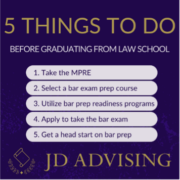Agency and Partnership on the Multistate Essay Exam
Tips for Agency and Partnership on the Multistate Essay Exam
This time in our MEE tips series we address Agency and Partnership. When thinking about Agency and Partnership on the Multistate Essay Exam, you should consider two questions: how is it tested? And how often is it tested? In the last 10 years (20 administrations), we’ve seen Agency and Partnership on the Multistate Essay Exam 11 times on its own and twice combined with Torts. This makes Agency and Partnership on the Multistate Essay Exam relatively common. It also means you have to be aware of how the Examiners can utilize it in combination with other subjects. This is especially true since Agency and Partnership themselves are two separate topics that are interwoven together. Add in Torts, and the Examiners can go in many directions.
Tips for Agency and Partnership on the Multistate Essay Exam
Standard disclaimer: make sure you are preparing for all of the subjects! Statistics regarding the frequency we see Agency and Partnership on the Multistate Essay Exam should be used in determining how much to study for the subject, not whether to study for it at all. Spend the most time on the subjects that are the most likely to come up. But do not ignore any subject!
Here are the most commonly tested topics in Agency and Partnership on the Multistate Essay Exam:
Agency
Requirements for an Agency Relationship
If you see a question on Agency and Partnership on the Multistate Essay Exam, be sure to confirm that an agency relationship exists. This means both consent and control must be present. First, we need consent by both the principal and the agent that the agent will act for the principal’s benefit. Second, the agent must be subject to the principal’s control. This relationship can terminate in several ways, including the principal manifesting a desire to the agent to discontinue the relationship.
Types of Authority
A principal will be bound on a contract entered into by an agent as long as the agent had authority to do so. There are two main types of authority: actual (which has two sub-categories) and apparent. Actual authority can be express, where the agent is expressly given authority to act for the principal, or implied. Implied authority exists when the agent is led to believe it has authority through the principal’s conduct.
For apparent authority to be present, we need three things.
- First, the person dealing with the agent must do so with a reasonable belief in the agent’s authority.
- Second, that belief must be generated by some act or neglect on the part of the principal.
- Third, the person dealing with the agent must not be negligent.
Even if the agent did not have authority, the principal can still become liable if it ratifies the acts. This means that the principal must expressly or impliedly affirm or accept the benefits of the acts as long as he knew the material facts and had capacity.
Note that this is also where we see a mix of issues in Agency and Partnership on the Multistate Essay Exam. Partners in a general partnership generally have actual and apparent authority to bind the partnership for contracts entered into in the ordinary course of business.
Vicarious Liability
A principal can be held liable for the torts of its agents through the theory of vicarious liability (respondeat superior). Under this theory, an employer/principal is liable in tort for the act of an agent or employee if the agent or employee was:
- (1) acting in the scope of employment, or
- (2) made a minor deviation (detour) from employment, or
- (3) if the tort was an intentional tort, if it was for the principal’s benefit, because the principal authorized it ,or because it arose naturally due to the nature of employment.
Partnership
Formation of a Partnership
Creating a partnership does not require much. If you see a question in Agency and Partnership on the Multistate Essay Exam that asks you whether a partnership has been formed, the answer is more often than not “yes.” A partnership is the association of two or more persons to carry on as co-owners a business for profit, whether or not they intended to form the partnership. The existence of profit sharing creates a presumption that a person is a partner unless the profits were received in payment of a debt, rent to a landlord, wages, etc. Other factors include capital contributions and mutual agency. No writing nor filing of a certificate needs to occur for a general partnership to be formed.
Relationship Between Partners
This is another significant area in which we see overlap in Agency and Partnership on the Multistate Essay Exam. All partners are agents and co-managers of the partnership. They have equal rights to co-manage, and a majority vote wins if there is a disagreement on an ordinary matter. In a general partnership, partners are jointly and severally liable for partnership debts. An incoming partner is not personally liable for prior debts of the partnership. Outgoing partners are personally liable to creditors for debts incurred while they were a partner.
Partners also have fiduciary duties. They are in a fiduciary relationship with one another and must act with honesty and in good faith. They possess a duty of loyalty, meaning they cannot usurp corporate opportunities for personal advantage, engage in self-dealing, or compete with the partnership. Finally, they also have a duty of care, and the duty to account.
Seeking MEE Expertise?
🌟 Freebies & Discounts
- Free Bar Exam Resource Center: Explore for leading guides, articles, and webinars.
- Expert-Crafted Bar Exam Guides: Unveil insights on high-frequency MEE topics and strategies for success.
- Free Webinars: Engage with top bar exam experts.
🔥 Top-Rated MEE Resources
- MEE One-Sheets: Boost your confidence with our most popular bar exam product!
- Bar Exam Outlines: Our comprehensive and condensed bar exam outlines present key information in an organized, easy-to-digest layout.
- NEW MEE Mastery Class: Unearth focused, engaging reviews of essential MEE topics.
- Bar Exam Crash Course and Mini Outlines: Opt for a swift, comprehensive refresher.
- MEE Private Tutoring and feedback: Elevate your approach with tailored success strategies.
- MEE Course: Preview our acclaimed five-star program for unmatched instruction, outlines, and questions.
🔥 NEW! Dive deep into our Repeat Taker Bar Exam Course and discover our unrivaled Platinum Guarantee Pass Program.




